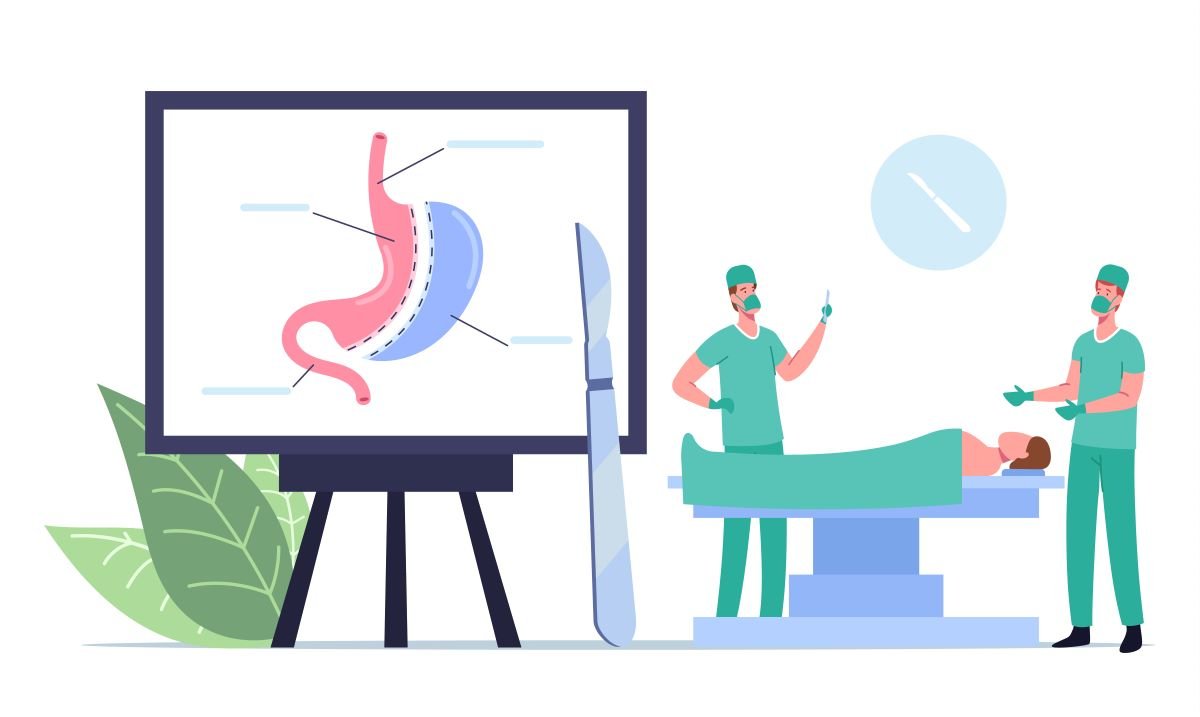No, gastric sleeve cannot be reversed. Gastric sleeve surgery permanently reduces the size of the stomach to facilitate weight loss.
Take charge of your weight loss journey with the ultimate Gastric Sleeve Surgery Full Guide. From pre-surgery preparations to post-operative care, this comprehensive resource empowers you with the knowledge needed to embrace a healthier, more fulfilling lifestyle.
Gastric sleeve surgery, also known as sleeve gastrectomy, is a popular weight loss procedure that involves removing a portion of the stomach to create a smaller, sleeve-shaped stomach. This restriction in stomach size limits the amount of food consumed, leading to decreased appetite and weight loss.
However, it is essential to note that the gastric sleeve surgery is irreversible. Once the stomach has been surgically altered, it cannot be reversed. This means that the smaller stomach size and the resulting weight loss are permanent changes. If a patient is considering gastric sleeve surgery, it is crucial to thoroughly discuss the potential risks and benefits with a qualified healthcare professional before deciding.

Understanding Gastric Sleeve Surgery
Gastric sleeve surgery, also known as sleeve gastrectomy, is a popular weight loss procedure involving removing a large portion of the stomach. This procedure helps patients achieve significant weight loss by reducing their appetite and restricting their food consumption. Understanding gastric sleeve surgery is essential for those considering this weight loss option, as it provides valuable insights into the procedure’s workings, benefits, and risks.
What Is Gastric Sleeve Surgery?
Gastric sleeve surgery is a surgical weight loss procedure that involves reducing the stomach size. During the process, a large portion of the stomach is removed to create a small, sleeve-shaped pouch. This smaller stomach restricts the amount of food you can eat and significantly reduces your appetite. The surgery not only helps patients achieve weight loss but also improves obesity-related health conditions, such as diabetes, high blood pressure, and sleep apnea.
How Does Gastric Sleeve Surgery Work?
Gastric sleeve surgery works by reducing the size of the stomach and modifying its shape. The surgeon removes approximately 80% of the stomach, leaving behind a small, banana-shaped pouch or sleeve. This sleeve-shaped stomach restricts the amount of food you can eat, promoting a feeling of fullness or satiety after consuming a smaller portion.
Unlike other weight loss surgeries, such as gastric bypass, gastric sleeve surgery does not involve rerouting the digestive tract. This means that the surgery not only aids weight loss but also allows for the normal absorption of nutrients from food. The procedure typically takes one to two hours, and most patients can expect to stay in the hospital for a day or two after the surgery.
Benefits And Risks Of Gastric Sleeve Surgery
There are many advantages to gastric sleeve surgery for those who are battling obesity and associated medical disorders. Some of the key benefits include:
- Significant weight loss: Patients can expect to lose substantial weight within the first year after the surgery, with many experiencing long-term weight loss success.
- Improved obesity-related health conditions: Gastric sleeve surgery often leads to improvements or complete resolution of obesity-related health conditions such as diabetes, high blood pressure, and sleep apnea.
- Enhanced quality of life: Weight loss achieved through gastric sleeve surgery can significantly improve a person’s overall well-being, self-esteem, and body image.
However, gastric sleeve surgery carries risks and potential complications, like any surgical procedure. It’s critical to understand these dangers, which may comprise:
- Infection: As with any surgery, there is a disease risk at the incision site or in the abdominal cavity.
- Long-term nutritional deficiencies: The reduced stomach size can affect the body’s ability to absorb certain nutrients, necessitating lifelong supplementation.
- Stomach stretching or pouch enlargement: Over time, the stomach pouch can stretch, allowing for more significant food portions and potentially reducing the effectiveness of the surgery.
These benefits and risks should be carefully considered and discussed with a healthcare professional to make an informed decision about undergoing gastric sleeve surgery.
Reversing Gastric Sleeve: Is It Possible?
Discover the possibility of reversing gastric sleeve surgery and its implications. Explore whether the gastric sleeve procedure can be undone and the potential outcomes for patients considering reversal.
Many people who have undergone gastric sleeve surgery may wonder if it is possible to reverse the procedure. While gastric sleeve surgery is an effective and popular weight loss treatment, various factors may lead individuals to consider changing the surgery. In this article, we will discuss the reasons for reversing gastric sleeve surgery, the options available, and the effectiveness and success rates of reversing this procedure.
Reasons For Reversing Gastric Sleeve Surgery
There are several reasons why individuals may consider reversing their gastric sleeve surgery. These reasons include:
- Inadequate weight loss: While gastric sleeve surgery generally promotes weight loss, some individuals may still need to achieve their goals. This can be due to factors such as individual metabolism, adherence to post-surgery dietary and lifestyle changes, and underlying medical conditions.
- Complications and side effects: Although gastric sleeve surgery is considered safe, there can be complications and side effects. These may include gastroesophageal reflux disease (GERD), vitamin deficiencies, dumping syndrome, or other digestive issues. If these severe complications significantly impact the individual’s quality of life, they may opt for reversal.
- Regain of weight: In some cases, individuals may experience weight regain after initially successful weight loss following gastric sleeve surgery. This can be due to factors such as overeating, the stretching of the stomach pouch over time, or a lack of adherence to the necessary dietary and lifestyle changes. Reversing the surgery is an option to address weight regain.
Reversal Options: Surgical And Non-surgical
When it comes to reversing gastric sleeve surgery, there are both surgical and non-surgical options available. The choice of the reversal method depends on several factors, including the individual’s specific situation, the reasons for reversal, and the advice of their healthcare provider.
Some surgical reversal options include:
- Gastric bypass surgery: In this procedure, the small intestine is rerouted to bypass most of the stomach, reducing the amount of food the body can absorb. Gastric bypass surgery can be an effective option for individuals who have experienced weight regain, as it provides a more restrictive and malabsorptive solution.
- Gastric band placement: This procedure involves placing an adjustable band around the upper part of the stomach to create a smaller stomach pouch. This restricts the amount of food consumed, aiding in weight loss. Gastric band placement can be a potential reversal option for individuals who are seeking a less invasive procedure.
Non-surgical options for reversing gastric sleeve surgery include:
- Dietary and lifestyle changes: Making significant changes to nutritional habits and incorporating regular exercise can help individuals manage weight regain and overcome inadequate weight loss after gastric sleeve surgery. This option may be suitable for those who are not experiencing severe complications or side effects.
- Medical interventions: Depending on the specific situation, healthcare providers may recommend medications or therapies to address complications or side effects associated with gastric sleeve surgery. These interventions aim to alleviate symptoms and improve overall well-being without requiring surgical reversal.
Effectiveness And Success Rates Of Reversal Procedures
When considering gastric sleeve reversal, individuals may wonder about these procedures’ effectiveness and success rates. It’s important to note that the outcomes can vary depending on the specific circumstances, individual health, and surgical approach.
In general, gastric bypass surgery has shown promising results in weight loss and resolution of complications associated with gastric sleeve surgery. Studies have reported significant weight loss and improvement in comorbidities after gastric bypass as a reversal option.
On the other hand, gastric band placement for reversal may offer a less invasive alternative. However, its effectiveness may vary; some individuals may experience complications or limited weight loss results.
Non-surgical options such as dietary and lifestyle changes can effectively manage weight regain and inadequate weight loss after gastric sleeve surgery, particularly when combined with professional guidance and support.
Ultimately, the choice to reverse gastric sleeve surgery should be made after thorough consultation with healthcare professionals, considering individual circumstances, and weighing each reversal option’s potential benefits and risks.

Considerations And Alternatives
If you’re considering gastric sleeve surgery, it’s essential to be aware of the possibility of reversal. While gastric sleeve surgery is an effective weight loss procedure for many individuals, there are situations where reversal may be considered. In this article, we will discuss the long-term implications of gastric sleeve reversal and explore non-reversal options for weight loss. Remember, it’s crucial to consult a medical professional to determine the best approach for your specific needs and circumstances.
Long-term Implications Of Gastric Sleeve Reversal
Gastric sleeve reversal is uncommon, but it may sometimes be necessary. Some of the potential long-term implications of gastric sleeve reversal include:
- Restoration of the stomach’s original size: During gastric sleeve surgery, a significant portion of the stomach is permanently removed. Reversal surgery aims to restore the stomach to its pre-surgery size, allowing for a return to normal digestion and absorption of nutrients (National Institute of Diabetes and Digestive and Kidney Diseases, 2017).
- Potential weight regain: While gastric sleeve surgery helps individuals achieve significant weight loss, reversal may result in weight regain. It’s important to understand that reversing the procedure does not guarantee a return to the same weight or health status before surgery.
- Possible complications and risks: As with any surgical procedure, there are risks associated with gastric sleeve reversal. These risks may include bleeding, infection, anaesthesia-related complications, and the potential need for additional surgeries.
Exploring Non-reversal Options For Weight Loss
If you’re concerned about gastric sleeve reversal or want to explore non-reversal alternatives for weight loss, there are several options to consider. Some of these options include:
- Diet and exercise: Consistent healthy eating habits and regular physical activity can lead to gradual and sustainable weight loss.
- Behavioural modifications: Working with a registered dietitian or a behavioural therapist can help address the underlying emotional and psychological factors contributing to weight gain.
- Medication: In some instances, medicines may be prescribed to assist with weight loss. It’s important to note that medications should always be taken under the supervision of a medical professional.
- Other bariatric procedures: If gastric sleeve reversal is not an option or recommended, other bariatric procedures, such as gastric bypass or adjustable gastric banding, may be considered. These procedures have benefits, risks, and long-term implications, which should be discussed with a healthcare provider.
Consulting A Medical Professional For Personalized Advice
In conclusion, the decision to reverse gastric sleeve surgery or explore non-reversal options for weight loss should be made in consultation with a medical professional who can assess your circumstances and provide personalized advice. It’s essential to weigh the potential long-term implications of gastric sleeve reversal against the benefits and risks of alternative approaches. Prioritize open communication and education to make an informed decision about the best course of action for your health and well-being.
Benefit Gastric Sleeve Surgery For Weight Loss
Gastric Sleeve Surgery, also known as sleeve gastrectomy, is a surgical procedure that involves removing a portion of the stomach to create a smaller, sleeve-shaped stomach. This procedure has gained popularity as an effective method for weight loss among individuals struggling with obesity. In this comprehensive discussion, we will explore the potential benefits of Gastric Sleeve Surgery and its impact on weight loss.
Benefits of Gastric Sleeve Surgery:
- Significant Weight Loss: Gastric Sleeve Surgery is known for its effectiveness in promoting substantial weight loss. By reducing the size of the stomach, the surgery limits the amount of food a person can consume, leading to a significant decrease in calorie intake.
- Improved Metabolic Health: Beyond weight loss, gastric sleeve surgery has been associated with improved metabolic health. It can lead to better control of conditions such as type 2 diabetes, hypertension, and high cholesterol.
- Enhanced Quality of Life: Many individuals who undergo gastric sleeve surgery report improved overall quality of life. The surgery often results in increased energy levels, improved mobility, and a reduced risk of obesity-related health complications.
- Long-Term Weight Maintenance: Studies suggest that the weight loss achieved through gastric sleeve surgery can be sustained in the long term. Patients often experience a gradual and steady decline in weight, making it an effective solution for those seeking lasting results.
- Reduction in Obesity-Related Health Risks: Gastric sleeve surgery has been shown to decrease the risk of obesity-related health issues such as heart disease, sleep apnea, and joint problems. The surgery not only addresses weight loss but also contributes to an overall improvement in health.
Considerations and Precautions:
While Gastric Sleeve Surgery offers numerous benefits, it is essential to consider the potential risks and lifestyle changes associated with the procedure. Individuals must be well-informed and work closely with healthcare professionals to ensure a successful outcome. Additionally, post-surgery adherence to dietary guidelines and regular physical activity are critical factors in maintaining the positive effects of the surgery.
Gastric Sleeve Surgery has proven to be a beneficial and transformative solution for weight loss, allowing individuals to achieve significant and sustained results. While it is not without its considerations, the potential improvements in overall health and quality of life make it a viable option for those seeking practical and lasting weight loss solutions. As with any medical procedure, consulting with healthcare providers and understanding the full scope of the surgery are crucial steps in making informed decisions about one’s health and well-being.

Frequently Asked Questions For Can Gastric Sleeve Be Reversed
Can Your Stomach Go Back To Normal After Gastric Sleeve?
The stomach can return to its standard size after gastric sleeve surgery. The procedure involves removing a large portion of the stomach, resulting in a smaller pouch. Over time, the stomach can stretch, but with proper diet and exercise, it can return to its reduced size.
Is It Possible To Reset Your Gastric Sleeve?
No, resetting your gastric sleeve is not possible. This gastric surgery procedure is irreversible.
How Long Does Gastric Sleeve Last?
Gastric sleeve surgery offers long-term weight loss. Studies show most patients maintain weight loss at least five years after surgery. The procedure reduces stomach size, limits food intake, and promotes healthier eating habits. A healthy lifestyle is crucial for sustained results.
Can You Gain The Weight Back After Gastric Sleeve?
After gastric sleeve surgery, weight gain is indeed possible. However, maintaining a healthy lifestyle and following post-surgery guidelines can help minimize weight regain. Regular exercise, a balanced diet, and ongoing support from healthcare professionals are essential for long-term weight management.
Conclusion
It is essential to recognize that gastric sleeve surgery is not a one-size-fits-all solution, and outcomes can vary from person to person. Additionally, the decision to undergo any form of weight loss surgery should be approached with realistic expectations and a commitment to making sustainable lifestyle changes.
To sum it up, the decision to have a gastric sleeve procedure is serious, and it is essential to understand the possible outcomes and long-term effects. While gastric sleeve surgery is considered relatively permanent, it can be reversed in some cases.
Consulting with a medical professional is crucial to determine the best action. Understanding the potential complications and risks associated with reversing the procedure can help individuals make informed choices about their health and well-being. If you have any questions, ask Healthiosxchange.

I am Jahirul Islam. I am a physiotherapist and I have a lot of experience in this field. I want to share my experience with you. You will be by my side. Good luck for everyone..

